When learning a new language, there are always a few tricky verbs that seem to cause the most problems. French is no exception!
- Introducing the French present tense
- Why is it important to know the present tense of the verbs "être" (to be) and "avoir" (to have) PERFECTLY?
- These 10 verbs have many pitfalls when conjugated in the present tense
- How to avoid common traps when conjugating verbs in the French present tense?
- Now you don't have to worry about these 10 verbs in the present tense!
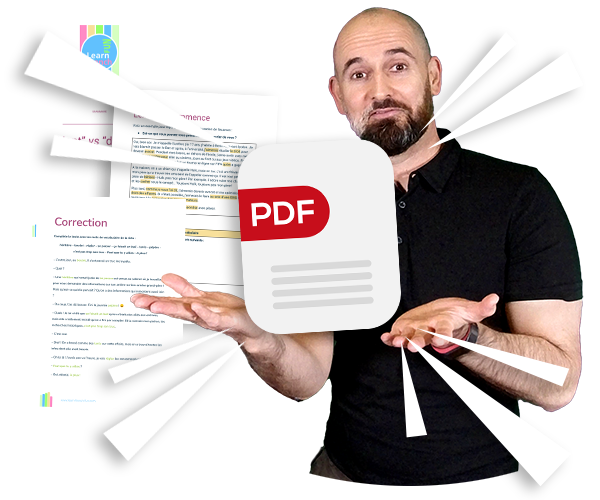
PDF Bonus
We have prepared a free PDF to help you master these 10 dangerous French verbs in the present tense.
👉 Download it for free
At the end, you will have exercises to practice with the correction. 👍
In this article, we will take a look at 10 common French verbs conjugated in the present tense, and highlight some of the traps you need to watch out for. There are of course other tenses of the French conjugation to know! For example, the future tense, the imperative, the subjunctive or know the different moods of French conjugation.
Be sure to practice and review these regularly, so you can sound like a native speaker with ease! And do not underestimate the interest or even the difficulty of the French present 😱😂
Introducing the French present tense
The French present tense is a very important part of the language. It’s used to describe actions that happen at the same time, or about things that are happening now. This makes it different from other tenses which usually talk about something in the past or future.
The use of the French present tense
1) The French present tense expresses a fact or an action that is taking place at the time we are speaking.
Examples :
- Où vas-tu ?
- Je vais à la plage.
2) But it can be used to tell a past fact “as if you were there” or to express a scientific truth or a usual fact.
Example:
La Lune tourne autour de la Terre.
The Moon revolves around the Earth.
3) Finally, the present can have a future value. This is more often the case when speaking.
Example:
Ce soir, je vais au cinéma.
Tonight I’m going to the movies.
Ce soir is the future! But when speaking, we can use the present with a future value.
Do you like learning French with videos?
Receive our free video newsletter every Friday in your e-mail box. You will get 3 “Tips & Tricks” on grammar, vocabulary, phonetics or French culture.
👉👉 Sign up now!
Why is it important to know the present tense of the verbs “être” (to be) and “avoir” (to have) PERFECTLY?
1) être and avoir are the two verbs most used by the French.
Therefore, it is extremely important to master their conjugation. Especially since it is irregular.
| être | avoir | |
| je (j’) | suis | ai |
| tu | es | as |
| il, elle, on | est | a |
| nous | sommes | avons |
| vous | êtes | avez |
| ils, elles | sont | ont |
2) être and avoir to conjugate the past tense
The second reason to master the conjugation of être and avoir in the present tense is that they are used to conjugate the past tense (passé composé) of all other verbs.
Examples:
- Je suis allé au restaurant. (I went to the restaurant)
- Tu as fait tes devoirs. (You’ve done your homework)
These 10 verbs have many pitfalls when conjugated in the present tense
The 10 verbs we will see:
- attendre (to wait),
- battre (to beat),
- dire (to say),
- faire (to do),
- pouvoir (to can),
- rire (to laugh),
- suivre (to follow),
- vouloir (to want),
- s’asseoir (to sit),
- croire (to believe)
1. attendre (to wait)
j’attends
tu attends
il/elle/on attend
nous attendons
vous attendez
ils/elles attendent
Phonétique de la conjugaison :
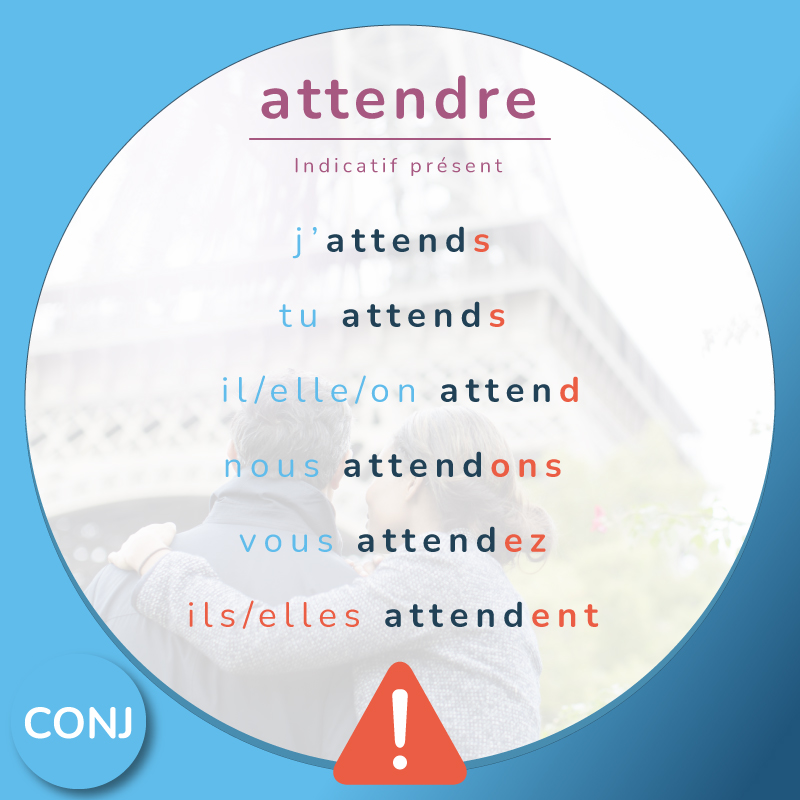
2. battre (to beat)
je bats
tu bats
il/elle/on bat
nous battons
vous battez
ils/elles battent
Phonétique de la conjugaison :
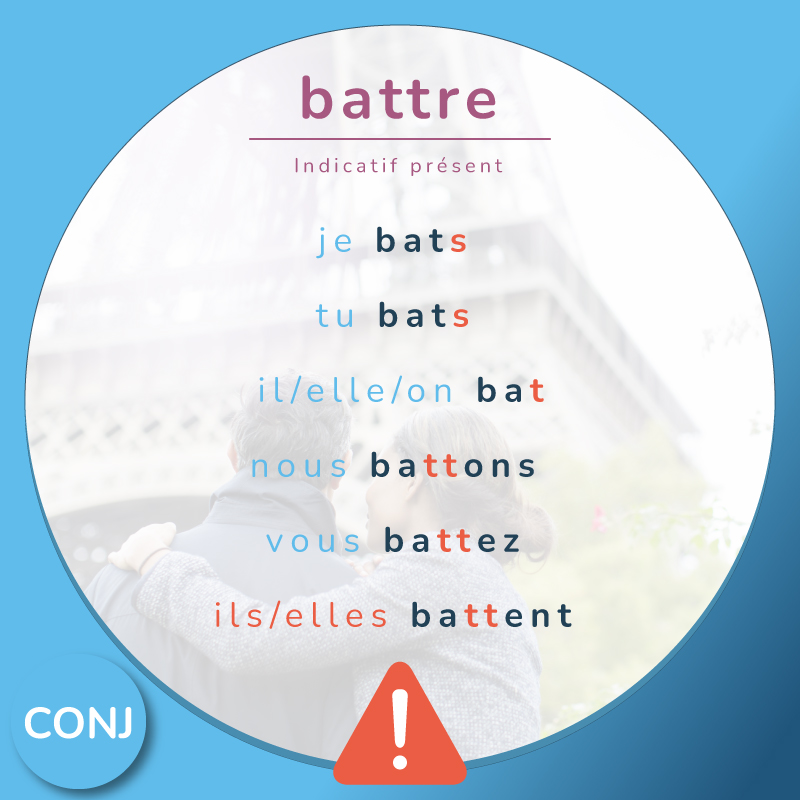
3. dire (to say)
je dis
tu dis
il/elle/on dit
nous disons
vous dites
ils/elles disent
Phonétique de la conjugaison :
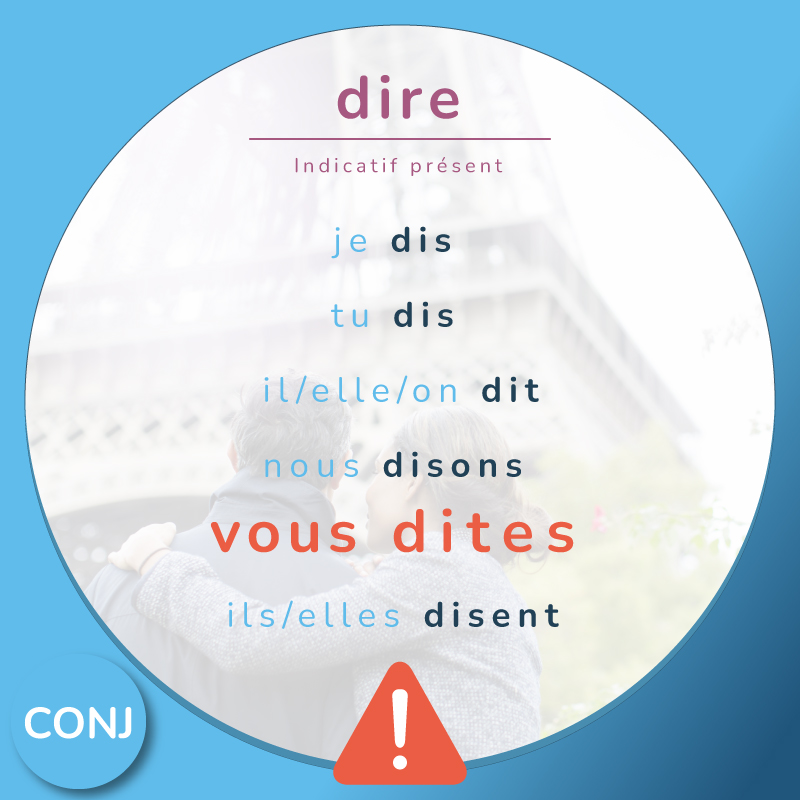
4. faire (to do)
je fais
tu fais
il/elle/on fait
nous faisons
vous faites
ils/elles font
Phonétique de la conjugaison :
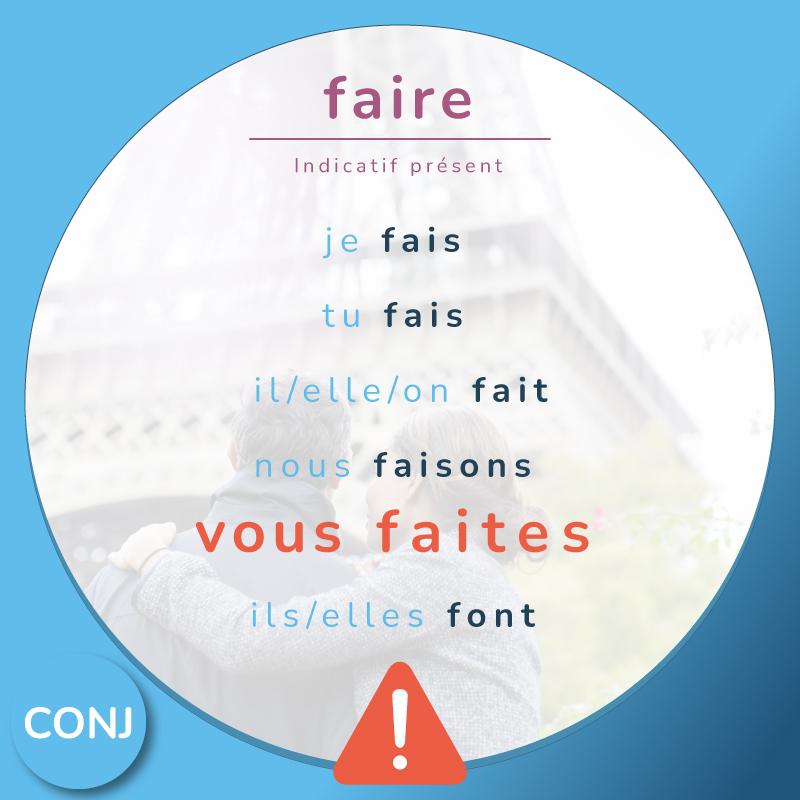
5. pouvoir (to can)
je peux
tu peux
il/elle/on peut
nous pouvons
vous pouvez
ils/elles peuvent
Phonétique de la conjugaison :
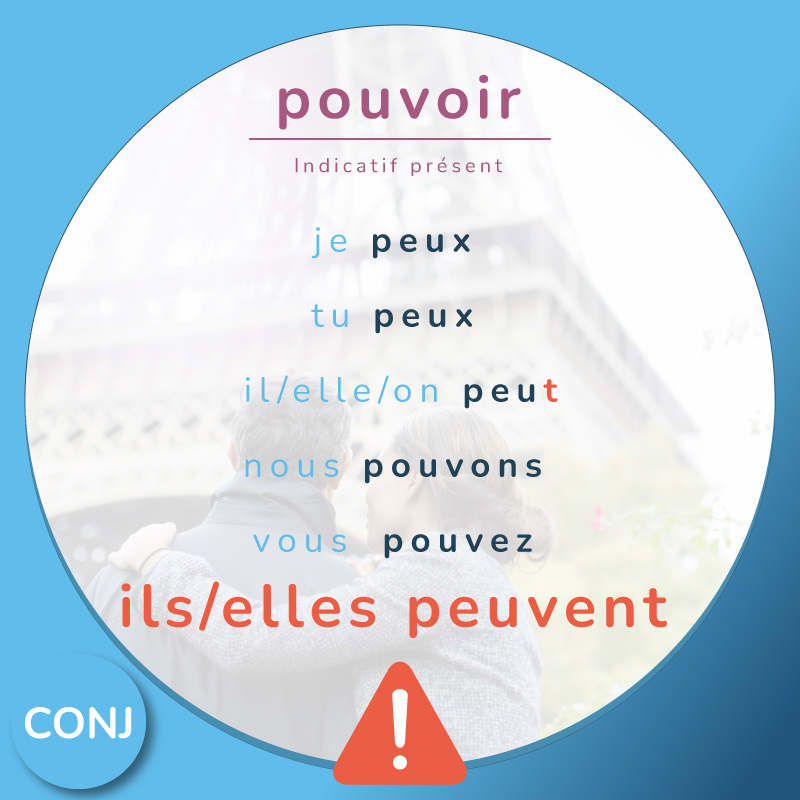
6. rire (to laugh)
je ris
tu ris
il/elle/on rit
nous rions
vous riez
ils/elles rient
Phonétique de la conjugaison :
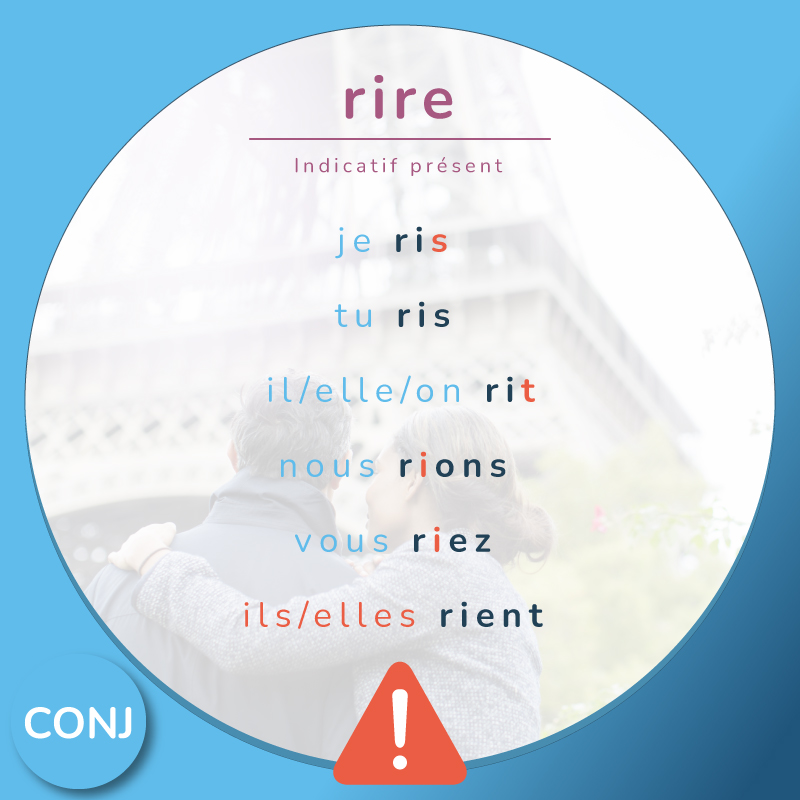
7. suivre (to follow)
je suis
tu suis
il/elle/on suit
nous suivons
vous suivez
ils/elles suivent
Phonétique de la conjugaison :
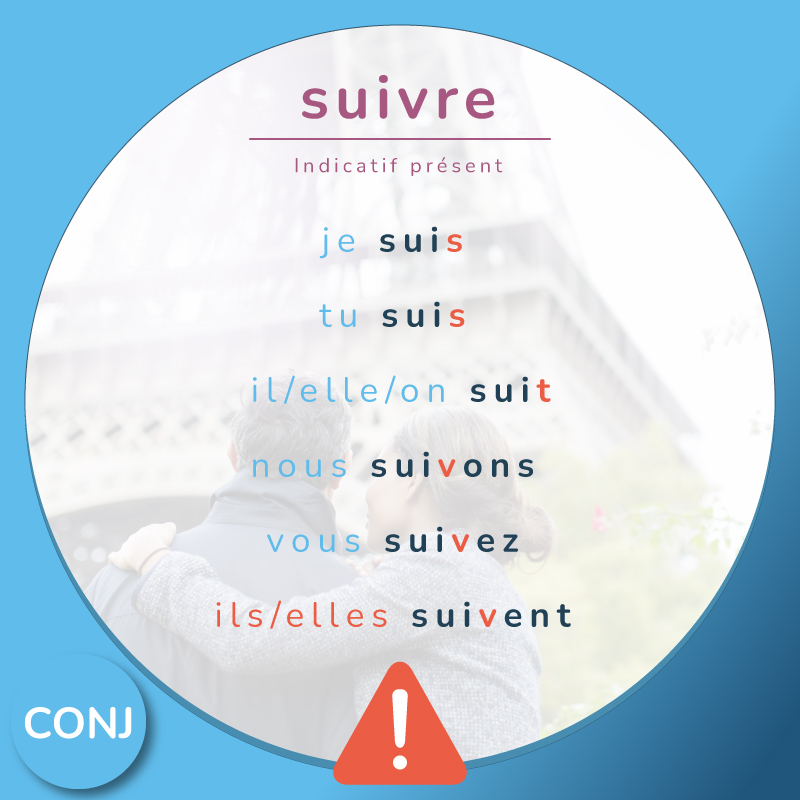
8. vouloir (to want)
je veux
tu veux
il/elle/on veut
nous voulons
vous voulez
ils/elles veulent
Phonétique de la conjugaison :
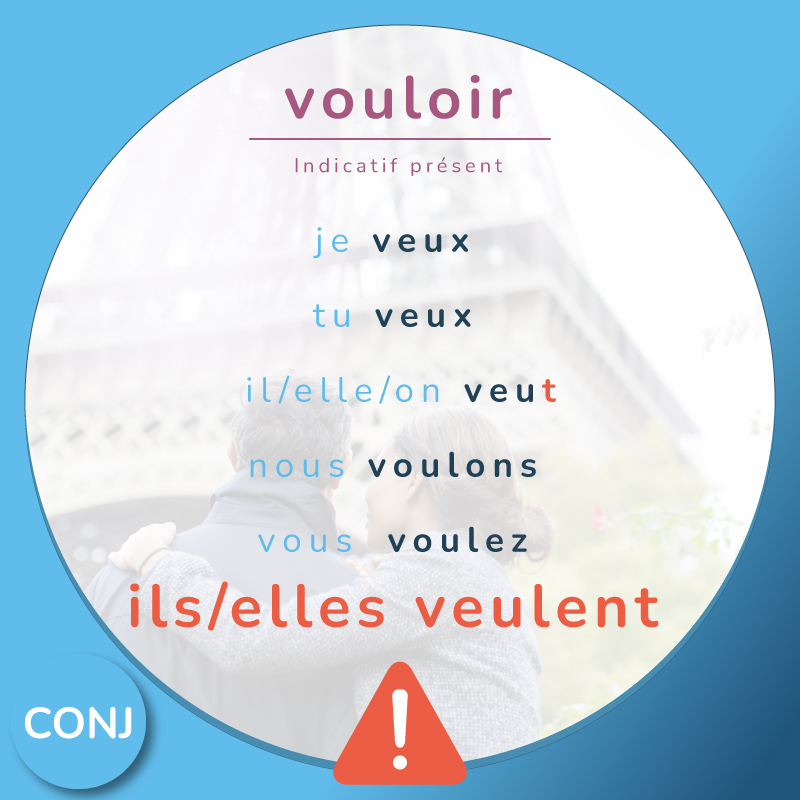
9. s’asseoir (to sit)
je m’assieds
tu t’assieds
il/elle/on s’assied
nous nous asseyons
vous vous asseyez
ils/elles s’asseyent
Phonétique de la conjugaison :
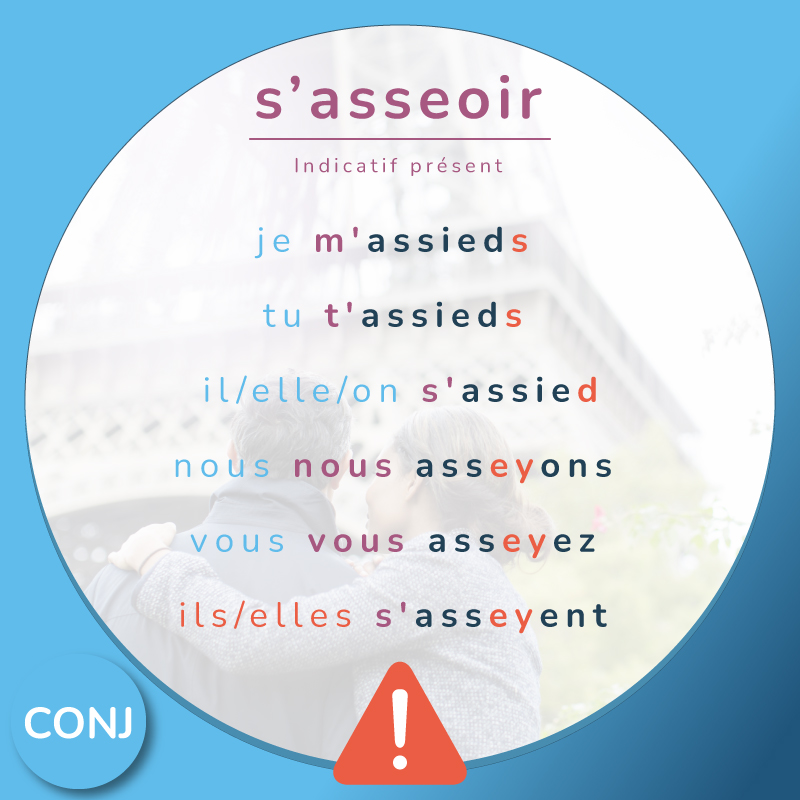
10. croire (to believe)
je crois
tu crois
il/elle/on croit
nous croyons
vous croyez
ils/elles croient
Phonétique de la conjugaison :
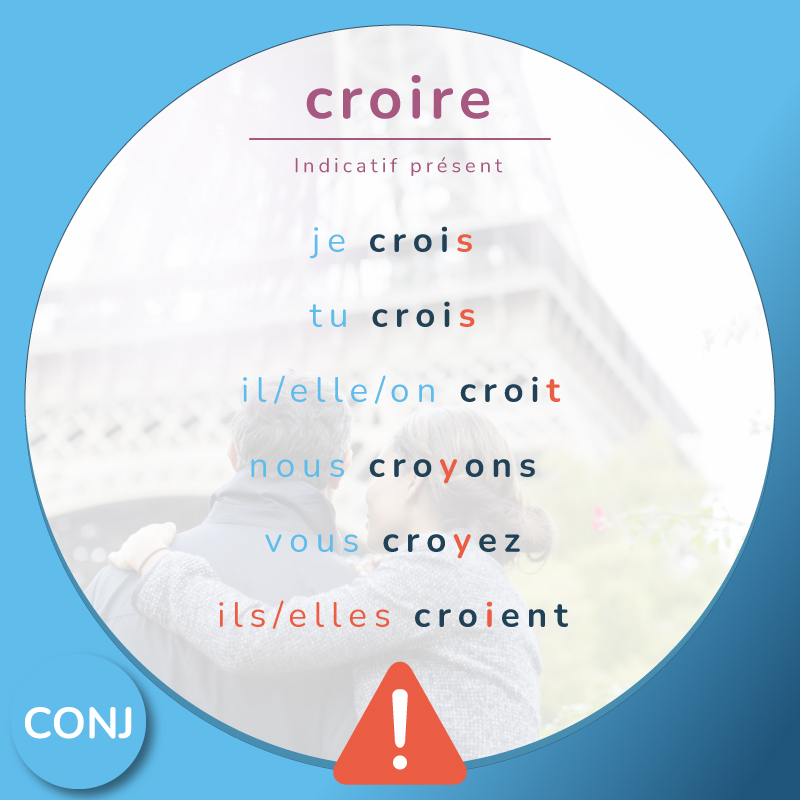
Do you know the Instagram account of Learn French Fun? You’re going to find a lot of examples of conjugations there that you need to watch out for!
How to avoid common traps when conjugating verbs in the French present tense?
When learning French, it’s important to be aware of the common traps that can occur when conjugating verbs in the present tense.
Here are a few tips to help you avoid making mistakes:
1) Make sure you know the conjugation for the verbs “être” and “avoir” perfectly. These two verbs are among the most commonly used in French, and their conjugation is irregular. So it’s important to master them!
2) Be aware of the different ways that the present tense can be used. It can express an action that is happening at the time we are speaking, a past fact “as if you were there”, or a future event.
3) Practice regularly! Don’t be afraid to make mistakes! Little by little, you’ll get better and better at speaking French!
Now you don’t have to worry about these 10 verbs in the present tense!
So, there you have it – the 10 common French verbs conjugated in the present tense. Just like with any other language, practice makes perfect! Be sure to review these regularly and you’ll be sounding like a native speaker before you know it.
Are you ready to start learning French online? At Learn French Fun, we offer fun and interactive videos that make learning a breeze.
With tons of real-world examples and plenty of exercises to test your knowledge, you’ll be able to progress quickly from beginner to intermediate level.
Check us out today and see for yourself how easy it can be to learn a new language!
And don’t forget our Youtube channel with educational videos to help you improve your French.
A bientôt 😀
Articles that might interest you:
- The Imperative in French: How to Conjugate Verbs in Imperative? When do You Have to Use the Imperative?
- The 10 Irregular Verbs in the French Subjunctive Mood
- Depuis, pendant, en, il y a, dans
- All the secrets of the French gerund!
- French verb moods
- How to use the tonic pronouns in French?
- How to use “en” and “y” pronoun in French?
- Difference between DONT and DUQUEL in French
- 10 common French verbs conjugated in the present tense. Beware of traps!
- The Direct Object Complement in French (C.O.D.) and direct complement pronouns (le, la, les…)





2 thoughts on “<strong>10 common French verbs conjugated in the present tense. Beware of traps!</strong>”
Comments are closed.